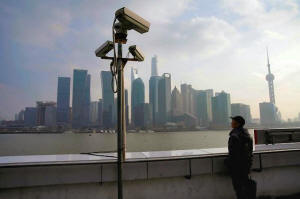|
Exclusive: China Inc tightens reins on
debt, raises specter of slowdown
 Send a link to a friend
Send a link to a friend
 [May 25, 2018]
By Adam Jourdan and Gaurav Dogra [May 25, 2018]
By Adam Jourdan and Gaurav Dogra
SHANGHAI/BENGALURU (Reuters) - Debt growth
for Chinese companies has slowed to the lowest rate in more than a
decade, according to Reuters analysis, which could provide relief for
policymakers worried about the fallout from years of loose lending
practices across the economy.
But this growing caution about taking on new debt, along with tighter
profit margins and slowing revenue growth, could point to rising risks
facing the world's second largest economy amid fears of a slowing
growth.
The overall debt levels of Chinese companies grew three percent in the
first quarter of this year, according to analysis by Reuters of 1,843
firms listed in Shanghai and Shenzhen, the slowest pace in at least 13
years.
Combined total debts - including borrowing via loans and bond issuances
- amounted to 13.2 trillion yuan ($2.1 trillion) at the end of March,
the slowest pace of growth year-on-year since at least 2005, the
analysis showed.

That amount was down 6.2 percent from the fourth quarter, a steep drop
after companies ramped up leverage during 2017.
For a graphic on China firms' net profit margin, click
https://reut.rs/2Lnvddc
Revenue growth, meanwhile, more than halved to 12.3 percent in the first
three months of 2018 from 26.7 percent a year ago. Net profit margins
were also squeezed to their lowest level in two years, with sectors like
information technology particularly hard hit.
"What it says to me is that many of these companies are quite cautious
in terms of expansion and taking on new debt," said Christopher Lee,
Hong Kong-based managing director for corporate ratings at S&P Global,
referring to the data.
"The side effects will be slower industrial growth and slower GDP growth
than what was achieved in 2017," he added.
The signs of slowing revenue growth in the Reuters analysis adds to a
series of data pointing to vulnerabilities in China's economy, even as
policymakers try to navigate debt risks and defuse a trade row with the
United States.
Despite stronger-than-expected first-quarter economic growth, economists
polled by Reuters still expect a gradual slowdown to around 6.5 percent
this year from 6.9 percent in 2017, as rising borrowing costs weigh on
consumption and investment.
China saw fixed asset investment grow at its slowest rate since 1999 in
April, while retail sales growth hit a four-month low. Home sales have
also slowed as the government tightens controls in order to fight
speculation and tame property prices.
For a graphic on China firms' revenue growth, click
https://reut.rs/2LjtJB3
Firms, meanwhile, are worrying about higher financing costs, as the
government cracks down on riskier lending practices.
"As soon as we have the cash then we'll make repayments because if our
debt-to-asset ratio is too high then our costs are also high," said an
official at Xinjiang Youhao Group, which runs supermarkets and malls.
"We need to think about financing costs."
The retailer's total debt of 1.3 billion yuan is at its lowest level
since 2012.
[to top of second column]
|

A man stands on the Bund in front of Shanghai's financial district
of Pudong in Shanghai, China February 26, 2018. REUTERS/Aly Song

The slower growth could put credit in the spotlight. Cutting debt
levels has been Beijing's aim, but any signs that this may have gone
too far - risking a broader drag on the economy - could prompt a
rethink about financial tightening.
"The stronger-than-expected credit slowdown since December 2017 has
led policymakers to take some action towards easing," Oxford
Economics said in a report this week, pointing to overall credit
growth slowing more than expected this year.
Borrowing costs are on the rise. The weighted average lending rate
for non-financial firms, a key indicator reflecting corporate
funding costs, rose 22 basis points in the first quarter.
The proportion of loans priced above the benchmark borrowing rate
also jumped by 9.9 percentage points to 74.4 percent in the first
quarter, the highest since China started releasing such numbers in
2004, according to Nomura.
Creditors and investors have also become more picky about where they
put their money as credit risks have climbed, making it harder for
some corporate issuers to raise funds.
Last month, 81 Chinese bond issues worth 47 billion yuan were
postponed or canceled, according to data compiled by Reuters. That
followed 47.4 billion yuan of bond issues that suffered a similar
fate in March.
Beijing Orient Landscape & Environment Co Ltd this month attracted
just 50 million yuan for a bond issue that was meant to raise as
much as 1 billion yuan.
A spate of bond defaults hasn't helped, with 11 companies in China
defaulting on bond payments since January.

For a graphic on China listed companies' total debt, click
https://reut.rs/2LmhoMb
Beijing is already working to reduce business costs, cutting
electricity prices twice in recent months, and is trying to channel
more bank funding to smaller firms, which hasn't done much yet to
ease concerns over rising costs.
"Because of rising defaults many investors are taking another look
at the market and are becoming much more cautious in committing new
investment," said S&P's Lee.
"Many investors now realize this deleveraging campaign and liquidity
tightening is affecting a much broader number of companies than was
initially thought."
(Reporting by Adam Jourdan in SHANGHAI and Guarav Dogra in
BENGALURU; Additional reporting by Shanghai Newsroom; Editing by
Miyoung Kim and Philip McClellan)
[© 2018 Thomson Reuters. All rights
reserved.]
Copyright 2018 Reuters. All rights reserved. This material may not be published,
broadcast, rewritten or redistributed.
Thompson Reuters is solely responsible for this content. |